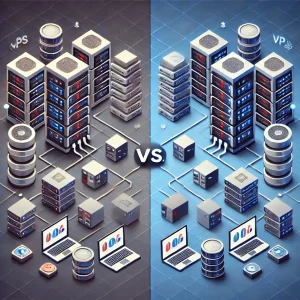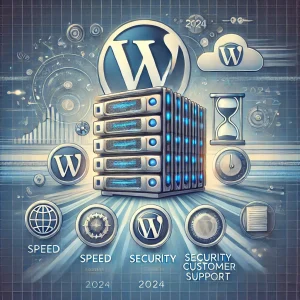Best Web Hosting Types for Small Businesses in 2024
Choosing the best web hosting types for small businesses in 2024 is crucial for establishing a strong online presence. With the digital landscape evolving rapidly, understanding the different options available is essential for making informed decisions that align with your specific needs and budgets. This guide will help you navigate the best web hosting types for small businesses in 2024 and ensure you choose the right one for your business.
Why Web Hosting Matters for Small Businesses
Understanding the best web hosting types for small businesses in 2024 is vital because web hosting is the foundation of your website. It affects everything from your site’s speed and security to its uptime and reliability. For small businesses, where every customer interaction counts, selecting the best web hosting types for small businesses in 2024 can make the difference between a smooth, professional online experience and one that frustrates potential clients. In 2024, the competitive nature of the online market means that small businesses must choose a hosting solution that supports their growth, security, and user experience.
Key Factors to Consider When Choosing the Best Web Hosting Types for Small Businesses in 2024
Before diving into the different options for the best web hosting types for small businesses in 2024, it’s important to understand the key factors that should influence your decision:
- Budget: How much are you willing to invest in the best web hosting types for small businesses in 2024?
- Technical Expertise: Do you have the technical know-how to manage your hosting, or do you need a managed solution?
- Scalability: Can the best web hosting types for small businesses in 2024 grow with your business?
- Performance Requirements: How fast does your website need to be? Do you expect high traffic?
- Security Needs: What level of security does your business require?
1. Shared Hosting: The Cost-Effective Solution
Shared hosting remains one of the best web hosting types for small businesses in 2024 due to its affordability. In this setup, multiple websites share the same server resources, such as CPU, RAM, and storage. This sharing of resources makes it a cost-effective option, especially for small businesses that are just starting.
Advantages of Shared Hosting:
- Low Cost: Shared hosting plans are typically the most affordable, making them one of the best web hosting types for small businesses in 2024 with limited budgets.
- Ease of Use: Many shared hosting providers offer user-friendly control panels and one-click installations, making it easy for beginners to manage their websites.
- Maintenance: Server maintenance and management are handled by the hosting provider, reducing the technical burden on business owners.
Disadvantages of Shared Hosting:
- Limited Resources: Since resources are shared with other websites, your site’s performance can be affected by traffic spikes on other sites.
- Security Risks: Sharing a server with other websites can increase the risk of security vulnerabilities.
- Scalability Issues: Shared hosting may not be able to handle significant traffic increases, limiting your ability to scale.
2. Virtual Private Server (VPS) Hosting: Balancing Cost and Performance
VPS hosting is a step up from shared hosting, offering more control and resources without the high cost of a dedicated server. This makes VPS one of the best web hosting types for small businesses in 2024 that need more power and control.
Advantages of VPS Hosting:
- Improved Performance: With dedicated resources such as RAM and CPU, VPS hosting offers better performance compared to shared hosting.
- Scalability: VPS plans are often scalable, allowing you to increase resources as your business grows.
- Control: You have more control over your server environment, including the ability to install custom software and configurations.
- Enhanced Security: VPS hosting provides better security isolation between websites, reducing the risk of security breaches.
Disadvantages of VPS Hosting:
- Higher Cost: VPS hosting is more expensive than shared hosting, though still more affordable than a dedicated server.
- Technical Expertise Required: Managing a VPS can be more complex, requiring some technical knowledge.
3. Cloud Hosting: Scalability and Flexibility
Cloud hosting has gained popularity and stands out as one of the best web hosting types for small businesses in 2024 due to its flexibility and scalability. Instead of relying on a single server, cloud hosting uses a network of interconnected servers to host your website. This distributed approach allows your site to tap into the resources of multiple servers, offering greater reliability and scalability.
Advantages of Cloud Hosting:
- Scalability: Cloud hosting allows you to easily scale resources up or down based on your website’s needs, making it one of the best web hosting types for small businesses in 2024 with fluctuating traffic.
- Reliability: The distributed nature of cloud hosting means that your site is less likely to experience downtime, as it can switch to another server if one fails.
- Cost Efficiency: Cloud hosting often operates on a pay-as-you-go model, so you only pay for the resources you use.
Disadvantages of Cloud Hosting:
- Complexity: Managing cloud hosting can be more complex than traditional hosting options, especially for those without technical expertise.
- Variable Costs: While cost-efficient, the pay-as-you-go model can lead to unpredictable costs, especially if your traffic spikes unexpectedly.
4. Dedicated Hosting: Maximum Performance and Control
Dedicated hosting provides an entire server exclusively for your website, making it one of the best web hosting types for small businesses in 2024 that require high performance, complete control, and top-tier security.
Advantages of Dedicated Hosting:
- Full Control: You have complete control over the server, including the operating system, software, and configurations.
- High Performance: Since you’re not sharing resources with anyone else, your website can achieve optimal performance.
- Enhanced Security: Dedicated hosting offers the highest level of security, making it ideal for businesses that handle sensitive data.
Disadvantages of Dedicated Hosting:
- High Cost: Dedicated hosting is the most expensive option, which may not be feasible for all small businesses.
- Technical Expertise Required: Managing a dedicated server requires a high level of technical knowledge, or you may need to hire a dedicated IT team.
5. Managed WordPress Hosting: Tailored for WordPress Sites
For small businesses using WordPress, managed WordPress hosting is one of the best web hosting types for small businesses in 2024. This specialized hosting service takes care of all the technical aspects of running a WordPress site, including updates, security, and performance optimization.
Advantages of Managed WordPress Hosting:
- Optimized Performance: Servers are configured specifically for WordPress, offering better speed and performance.
- Automatic Updates: The hosting provider handles all WordPress updates, keeping your site secure and up-to-date.
- Enhanced Security: Managed WordPress hosting includes advanced security features designed to protect WordPress sites from common threats.
- Expert Support: Support teams are typically WordPress experts, providing specialized assistance when needed.
Disadvantages of Managed WordPress Hosting:
- Higher Cost: Managed WordPress hosting is generally more expensive than basic shared hosting.
- Limited Flexibility: This type of hosting is specifically for WordPress, so it’s not suitable if you plan to use other content management systems.
6. E-commerce Hosting: Specialized Hosting for Online Stores
E-commerce hosting is designed specifically for online stores, making it one of the best web hosting types for small businesses in 2024 that are looking to sell products or services online. It offers features such as SSL certificates, payment processing integration, and enhanced security.
Advantages of E-commerce Hosting:
- Security: E-commerce hosting includes features like SSL certificates and PCI compliance to ensure secure transactions.
- Performance: Hosting plans are optimized for online stores, providing fast load times and reliable uptime.
- Integrated Tools: Many e-commerce hosting providers offer tools like shopping carts, payment gateways, and inventory management.
Disadvantages of E-commerce Hosting:
- Higher Cost: E-commerce hosting tends to be more expensive due to the specialized features and security requirements.
- Complexity: Managing an e-commerce site can be more complex than a regular website, requiring more time and expertise.
Conclusion: Choosing the Best Web Hosting Types for Small Businesses in 2024
Selecting the best web hosting types for small businesses in 2024 depends on your specific needs, budget, and growth plans. Shared hosting is a great starting point for those on a tight budget, while VPS and cloud hosting offer a good balance of cost, performance, and scalability. Dedicated hosting is ideal for businesses that require maximum control and performance, whereas managed WordPress hosting and e-commerce hosting are perfect for specialized needs.
By understanding the best web hosting types for small businesses in 2024, you can make an informed decision that will support your business’s online success in 2024 and beyond. Remember, the right web hosting can play a pivotal role in your website’s performance, security, and overall user experience, so choose wisely.
This concludes our detailed look at the best web hosting types for small businesses in 2024. Whether you’re launching a new site or considering a switch, these insights should help you find a hosting solution that meets your needs and sets your business up for success.





